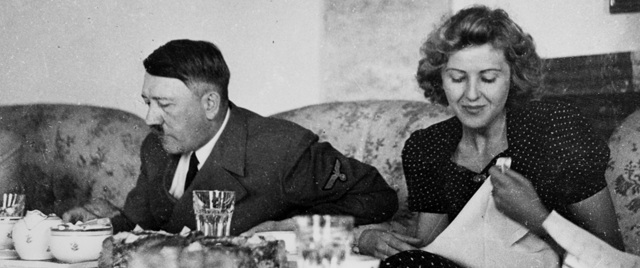
JULY 2009 — Call it a look at a day in the life of Hitler. The recollections of an anonymous German lieutenant colonel who served as Hitler’s war diarist in his Berlin bunker during World War II—and who says he dined with the Nazi leader more than 30 times—were auctioned off this spring by the British auction house Mullock’s. The six-page intelligence briefing, dated May 3, 1945, was compiled after the officer, who is referred to only as “PW” (prisoner of war), was captured and interrogated. Historians are marveling at his up-close observations of everything from Hitler’s musical preferences to his favorite cuisine. “We’ve always had this vision of Hitler as created by Goebbels or Leni Riefenstahl and all of the propaganda movies,” says Richard Westwood-Brookes, a historical documents expert for Mullock’s. “But this illustrates the human side of him. Underneath it all, he was a human being who liked cake.” A private collector purchased the documents for $3,000. Some excerpts:
On Hitler’s morning routine:
“Hitler gets up at about 11 or 11:30 in the morning. Half an hour later the first reports and briefings are given to him in the operations room of the Führerhauptquartier. At approx 1400 he eats a frugal meal and then takes his post-prandial nap of about an hour’s duration. He again returns to the operations room and continues to receive reports, briefings; various plans are discussed.”
On Hitler’s mysterious leadership style:
“Hitler likes to keep channels of cmd unclear so that he can profit by the confusion, and also because he does not trust anybody. He tolerates only staff offrs who give him a coloured optimistic picture of the situation. He has no use for the cool calculating staff offr who is able to face facts, even if they are uncomfortable. The only people in whom Hitler seemed to have confidence were Rommel and Speer.”
After a day of briefings, dinner around 8 p.m.:
“While this is the main meal, it is as simple as one could imagine. Hitler’s repast usually consists of some vegetable stew, followed by stewed fruit as dessert. This he tops with one or two glasses of beer (the extent of his alcoholic indulgence). Hitler eats rapidly, mechanically. For him food is merely an indispensable means of subsistence. In the course of a few minutes he is finished, but the entire meal usually lasts two hours.”
What is discussed:
“All members of the table engage in general topics of conversation. Quite often Hitler will sit there throughout the entire meal, turned to his own thoughts, seemingly without listening to the talk going on around him. However, he does follow the conversation vaguely, to him the conversation seems to have the effect that music has on others: it stimulates his thoughts and relaxes him. He talks in a mellow baritone, without that raucous, unpleasant stridency of his public speeches.”
On Hitler’s manners:
“At the table and in his speech he shows many facets of his rather uncouth behavior. He abstractedly biteshis fingernails, he runs his index finger back and forth under his nose, and his table manners are little short of shocking.”
On Hitler’s after-dinner routine:
“He would retire into his private chambers with some trusted high-ranking members of the party, where they would eat various snacks and listen to the phonograph. Hitler himself sipped some health tea during these hours of intimacy and ate prodigious amounts of cake (this cake eating was responsible for a slight digestive disorder and the addition of a ‘bay window’ to his already not too fortunate figure).”
Later in the evening came music:
“Hitler has a beautiful console-model phonograph with a high-class library of classic recordings. Wagner, Beethoven were his favorites in that order. He would produce some of these albums at these sessions with his friends and listen to the music with passion and rapture, if not artistic understanding.”
And then, a walk in the dark:
“Around 0200 he went out in the open, to walk up and down in front of his bunker. He always took his daily walk at night, completely alone. Hitler was highly susceptible to exposure to the sun which seemed to affect his brain in some way. Generally a man who lived at night.”




